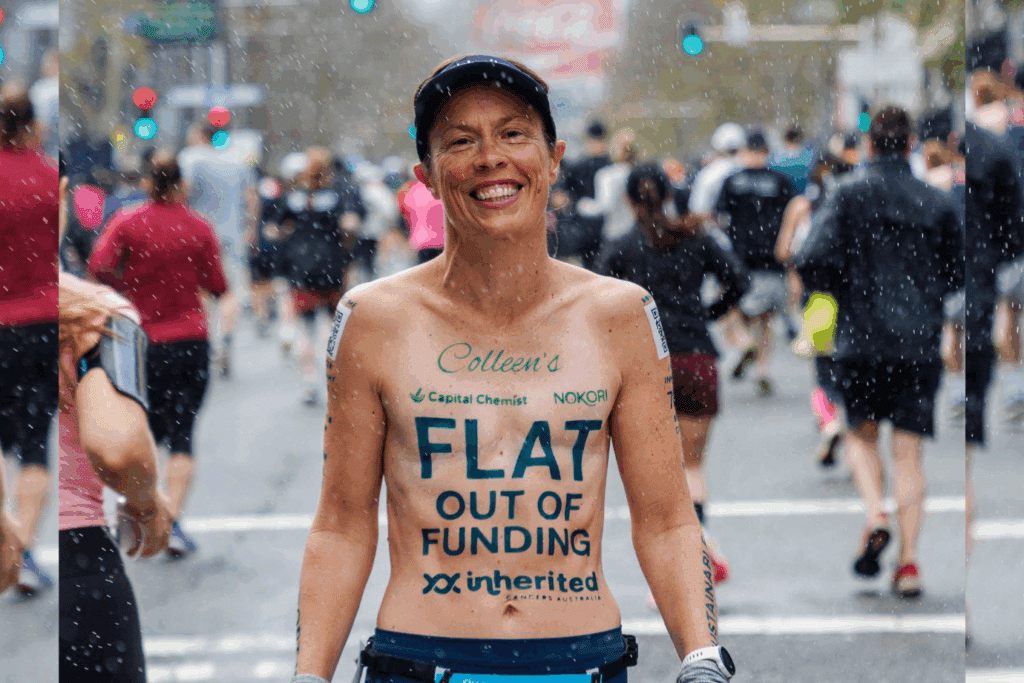One thing I was not worried about when I ran the City2Surf was a good supportive sports bra….
I often say that you can’t be what you can’t see, which was my biggest driver for recently running the City2Surf topless, baring my mastectomy scars on my flat chest. So women like me could feel seen. So my topless run could start a conversation to drive change for the thousands of women who choose to ‘go flat’ after a mastectomy.

A mastectomy is a surgery that over 8,000 Australian women have every year, some for cancer and others (like me) to reduce their risk of cancer. It’s deeply intimate, personal, and often terrifying.
In my run on the weekend, I had the words ‘FLAT out of funding’ and other statements temporarily tattooed across my chest and torso. These were a call to action for everyone to see. But there were two messages in my run, the message written on my chest and the message of my chest, both equally important.

I have been part of the ‘high-risk for cancer’ community since I was born, because cancer risk is something I inherited. After my grandma died of breast cancer at 53 and my mum’s ovarian cancer diagnosis and her subsequent passing at 66, I and many others in my family, found out we have a BRCA2 gene mutation. This is something we can’t control, yet something we are disadvantaged by every day. A BRCA2 gene mutation gives a woman a 70 per cent chance of developing breast cancer, an 18 per cent chance of developing ovarian cancer, and an increased risk of pancreatic cancer.
Women are disproportionately affected by gene mutations like BRCA and it wasn’t until more recently that I realised how much more is borne by us, compared to male carriers. We bear annual high-risk breast screening costs, risk reducing surgeries, time off work, financial impact, ongoing cost of hormone replacement therapy and doctors’ visits.
There is also the mental and emotional toll of changed bodies, loss of confidence, physical ability, and change in relationships. Men with BRCA gene mutations have an increased risk of prostate and breast cancer, so it is recommended they have annual PSA testing (a blood test) from 40 years old (family history dependent of course). And they should have manual prostate and breast checks. Statistics tell us that women undertake more genetic testing than men.
In 2024, over 13,000 people had publicly-funded genetic testing for cancer gene mutations. These are people who meet the strict criteria and we know there are many thousands more who undertake testing privately or overseas and those who don’t test because of discrimination worries. The numbers are continuing to grow as is the demand on support services.

I work at a charity called Inherited Cancers Australia, where we support the 1 in 400 Australians with gene mutations related to cancer (there are a lot of them, both people and gene mutations). We see every day the impact and the pressure of decisions that people have to consider when they are predisposed to cancer. Do I have a mastectomy? Can I do IVF and preimplantation genetic testing? Should I remove my ovaries at 35? How will my relationships be affected? Can I afford HRT? Can I wait two years for risk-reducing surgery? All of these decisions fall heavily on women—often made in the prime of our lives, as we build families, navigate careers, and shape our futures, carrying a weight that no one should have to bear alone
The charity where I work, who supports many thousands of people making these decisions, Inherited Cancers Australia, is underfunded. While Angelina Jolie brought much discussion around her experience with risk-reducing breast surgery back in 2013 after she was diagnosed with a BRCA1 gene, the ‘Angelina Jolie Effect’ as it was known has faded from public debate. There are no wealthy backers donating hundreds of thousands of dollars each year to our cause, and there has been zero Federal Government funding for our organisation but our organisation provides a vital service that eases the burden on government healthcare systems.
This brings me to why I chose to run topless through Sydney’s busy streets with 90,000 others, because our cause deserves attention and to highlight the urgent need for financial support. We wanted to raise the profile of what we do to support people who, through no fault of their own, are disadvantaged by the one thing that makes them who they are – their genes.

We want the conversation to change. We want people to start talking more openly about their family history of cancer and genetic testing. We need people to see the organisation that is dedicated to not only supporting this niche group of people but saving lives. We need the organisation to be valued, through sustained funding or corporate opportunities. So that families who experience cancer and cancer risk generation, after generation, after generation, feel seen and supported to make informed decisions to manage their risk.
Taking my top off and running down William Street with 90,000 other people is not something I would normally consider doing. Few people have seen my scars and many will understand how personal a mastectomy is (and I didn’t even have a cancer diagnosis to contend with). This was a big deal for me.
I want women to know that living flat is just as valid as living with reconstructed breasts. I also want people to back our organisation. Lift us up and help us to continue to positively impact people in our community and continue saving lives. Having a gene mutation is a life-long experience, and the cancer risk is always looming.
What I want from this very public and very personal run is to help break the cycle of cancer in Australian families and to inspire you to support our organisation financially—because every donation helps us provide vital services, raise awareness, and save lives.


